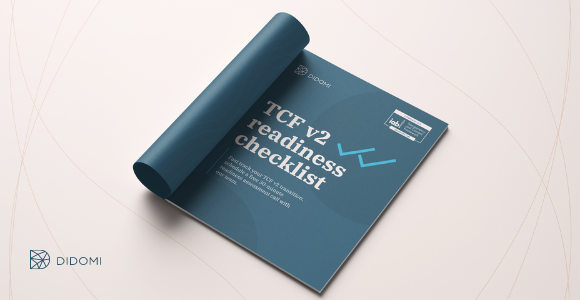Google is an important member of the TCF v2, and will begin reading and passing the TC string for all ad requests after the full IAB transition from TCF v1.1 to v2.0. The deadline for TCF v2 was the 15th August, but, to give publishers time to manage errors and misconfigurations, Google has provided a 90-day “grace period” to resolve any issues. So, if you’re worried about non-compliance, don’t be - there’s still some time left to make any final changes or a last-minute TCF v2 switchover! In either case, Didomi is here and ready to help.
Summary
- Introduction
- Grace period 0: Misconfiguration
- Grace period 1: TC string issues
- Grace period 2: Consent must be re-obtained
- Grace period 3: Global scope and out-of-band scope
- How can Didomi help?
Introduction
TCF is a standard for collecting and transmitting user consent across the digital advertising industry. It was created in 2018 by the IAB Europe and the IAB Techlab, and defines how consent is transmitted between adtech players, from the publisher to the demand-side.
Google joining TCF v2 consolidates the legitimacy of the framework and the importance of having a number of shared rules and common definitions for more industry transparency. However, switching to a new framework is not easy.
If you’re a publisher, you might be wondering what will happen if there are any errors or misconfigurations in your implementation. The 90-day grace period will differ slightly based upon the type of error being addressed, but Google will provide detailed reporting and troubleshooting information throughout.
Remember, if you have already implemented an IAB TCF v2 compliant CMP like Didomi’s, Google Ad Manager will automatically begin consuming the TC string from the CMP without the need for re-configuration. If you’re not currently TCF v2 compliant, but would like to ensure compliance and continue monetising, organise a free demo with Didomi today.
|
What are the 10 simple steps to ensure TCFv2 compliance? Download the Didomi TCFv2 Checklist to find out!
|
To find out more about the different types of grace period, and how they could affect your business, carry on reading. Or, for more information on what Google joining the TCF v2 means for publishers, check out our blog post on this subject here.
✍️ #BLOG ✍️#Google announced that they will join the #TCFv2, but what does this mean for #publishers❓
— Didomi (@Didomi_io) July 29, 2020
With Didomi, publishers can continue 2 use vendors that are NOT on the Global Vendor List (GVL) 👩💻
Read more 👉 https://t.co/iUBt5klPM0#programmatic #monetization #SSP #CMP
Grace period 0: Misconfiguration
This is for common situations in which publishers have misconfigured their CMP and failed to send a valid TC string.
Google will give 30 days to publishers to use the GDPR ad tech provider controls to solve misconfigurations without impacting monetisation. After 30 days, Google will serve non-personalised ads (NPA) for the remaining 60 days of the grace period.
So, essentially, you have 30 days to solve this before your monetisation is severely impacted. Or, you can call Didomi to ensure compliance and continued monetisation for your business.
Grace period 1: TC string issues
If you have significant flaws in your TC string, Google will only serve non-personalised (NPA) ads during the grace period.
As Google explains in their Troubleshooting TCF v2 Implementation article :
“Grace period 1 will be applied to issues in this category when there are problems with the TC string associated with an ad request. Ad requests will continue to be filled with non-personalised ads during the grace period. After the grace period ends, ad requests won't be filled.”
If your CMP ID is deemed invalid, make sure you are using an IAB-validated CMP (as of August 15th, both commercial and in-house CMPs must now be registered and pass the IAB’s compliance checks). Also, ensure that the ID of your CMP is correctly set in the TC strings.
If a CMP was valid when a TC string was generated but was later deleted by the IAB, you need to reobtain consent using a CMP such as Didomi’s, which features in the IAB list of validated CMPs.
Grace period 2: Consent must be re-obtained
This period is mainly for publishers who had already integrated with TCF v2 before Google announced that it would join the framework.
If this is the case for your business, you had probably already obtained consent from users outside of the TCF v2 prior to Google’s integration. Now the TCF v2 is fully up and running with Google as a member, you will unfortunately have to re-obtain consent. If 13 months have passed since the last time you obtained consent from a user, you will also have to re-obtain.
During this grace period, existing personalised and non-personalised ads will continue using the existing settings without impacting monetisation. But, don’t forget to solve this issue, as, after the grace period ends, ad requests won’t be filled.
Grace period 3: Global scope and out-of-band scope
This final grace period is intended for TC strings involving global scope and out-of-band scope (Ad Manager, AdMob, AdSense). Google will serve ads for these ad requests in accordance with the TC string, subject to Google’s policies. Once again though, do not forget to resolve this issue before the end of the grace period.
🎙️ WEBINAR REPLAY 🎙️
— Didomi (@Didomi_io) August 17, 2020
Did you miss our recent webinar "The Final Countdown: Key Considerations Before Switching Over To #TCFv2?" 🙋♂️
Don't miss out on the key steps to accelerate your transition! 📝
Watch the replay here 👉 https://t.co/dqthXCMHqY#data #consent #GDPR #privacy
How can Didomi help?
So, that’s a brief introduction on Google’s grace period policy, and the different types of grace periods your business could face.
Feeling overwhelmed, or worried about having your monetisation impacted? By the end of September, the IAB will stop supporting TCF version 1 altogether, and V1 consent strings will not be compatible with V2. The August 15th TCF v2 deadline may have already passed, but it is not too late for a last-minute switchover to TCF v2!
Didomi can ensure a swift and compliant switch-over, or help you through any TCF v2 difficulties your business may be facing. Organise a free demo with a TCF v2 expert today.
|
What are the 10 simple steps to ensure TCFv2 compliance? Download the Didomi TCFv2 Checklist to find out!
|











